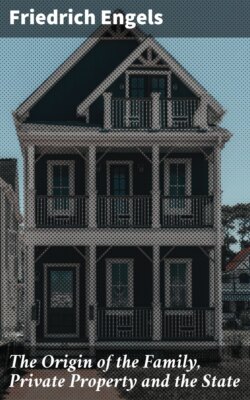Читать книгу The Origin of the Family, Private Property and the State - Friedrich Engels - Страница 4
На сайте Литреса книга снята с продажи.
AUTHOR'S PREFACE TO THE FIRST EDITION, 1884.
ОглавлениеTable of Contents
The following chapters are, in a certain sense, executing a bequest. It was no less a man than Karl Marx who had reserved to himself the privilege of displaying the results of Morgan's investigations in connection with his own materialistic conception of history—which I might call ours within certain limits. He wished thus to elucidate the full meaning of this conception. For in America, Morgan had, in a manner, discovered anew the materialistic conception of history, originated by Marx forty years ago. In comparing barbarism and civilization, he had arrived, in the main, at the same results as Marx. And just as "Capital" was zealously plagiarized and persistently passed over in silence by the professional economists in Germany, so Morgan's "Ancient Society"[1] was treated by the spokesmen of "prehistoric" science in England.
My work can offer only a meager substitute for that which my departed friend was not destined to accomplish. But in his copious extracts from Morgan, I have critical notes which I herewith reproduce as fully as feasible.
According to the materialistic conception, the decisive element of history is pre-eminently the production and reproduction of life and its material requirements. This implies, on the one hand, the production of the means of existence (food, clothing, shelter and the necessary tools); on the other hand, the generation of children, the propagation of the species. The social institutions, under which the people of a certain historical period and of a certain country are living, are dependent on these two forms of production; partly on the development of labor, partly on that of the family. The less labor is developed, and the less abundant the quantity of its production and, therefore, the wealth of society, the more society is seen to be under the domination of sexual ties. However, under this formation based on sexual ties, the productivity of labor is developed more and more. At the same time, private property and exchange, distinctions of wealth, exploitation of the labor power of others and, by this agency, the foundation of class antagonism, are formed. These new elements of society strive in the course of time to adapt the old state of society to the new conditions, until the impossibility of harmonizing these two at last leads to a complete revolution. The old form of society founded on sexual relations is abolished in the clash with the recently developed social classes. A new society steps into being, crystallized into the state. The units of the latter are no longer sexual, but local groups; a society in which family relations are entirely subordinated to property relations, thereby freely developing those class antagonisms and class struggles that make up the contents of all written history up to the present time.
Morgan deserves great credit for rediscovering and re-establishing in its main outlines this foundation of our written history, and of finding in the sexual organizations of the North American Indians the key that opens all the unfathomable riddles of most ancient Greek, Roman and German history. His book is not the work of a short day. For more than forty years he grappled with the subject, until he mastered it fully. Therefore his work is one of the few epochal publications of our time.
In the following demonstrations, the reader will, on the whole, easily distinguish what originated with Morgan and what was added by myself. In the historical sections on Greece and Rome, I have not limited myself to Morgan's material, but have added as much as I could supply. The sections on Celts and Germans essentially belong to me. Morgan had only sources of minor quality at his disposal, and for German conditions—aside from Tacitus—only the worthless, unbridled falsifications of Freeman. The economic deductions, sufficient for Morgan's purpose, but wholly inadequate for mine, were treated anew by myself. And lastly I am, of course, responsible for all final conclusions, unless Morgan is expressly quoted.
Frederick Engels.
